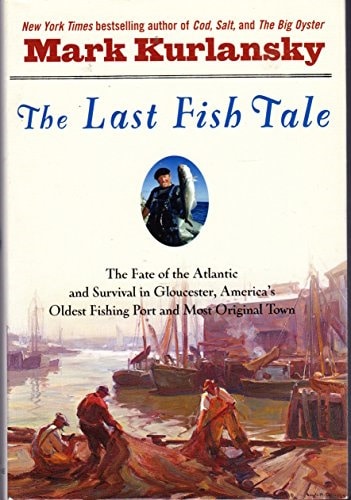My Dinner With Kurlansky – Fishing For Sustainability

I had dinner with Mark Kurlansky last night, author of such amazing books as Cod, Salt, and The Big Oyster: History on the Half Shell. Well, actually, that’s kind of a lie; I snacked while he spoke of his latest work, The Last Fish Tale. He came to the local Community Association in a small town in Connecticut to mingle, chat, and talk about his new book, and while I expected a packed venue, there ended up being only a small group attending.
I’m sure it had to do with the town being somewhat off the beaten track, if he were to speak in his native New York City I’m sure he would have packed the halls, but the atmosphere last night was quite causal and even intimate. He was animated and friendly, and eager to discuss anything we wanted, and as the night progressed, talk became more and more interesting.
What began with a reading from his new book turned into a Q&A session afterwards and an informal chat session later in the evening. After a few questions about his new book, and the city of Gloucester, the real protagonist, the topic quickly evolved into a long discussion about the plight of the creatures in our oceans.
The toll that modern fishing techniques, equipment and attitudes are taking on the sea is astounding. I have written many times about the plight of the Bluefin Tuna, but many other species such as Cod, Swordfish, the Patagonian Toothfish (Chilean Sea Bass), and even many species of shark are all in gave danger of disappearing from the waters that once sustained them.
The issues of Sustainable Fishing
Pollution, climate changes, and over fishing are all contributing on what seems to be a war against these creatures who are unable to protect themselves from man. It may make people think when many of our sushi items are no longer available, or are so overpriced as to be prohibitive, but the fear will set in when these foods are no longer available at all, and the reverberations are felt throughout our economies and lifestyle. Many lives depend on the sea, and not just those who fish.
Mr. Kurlansky raised a very interesting point last night. While many people have been calling for a boycott of various fish that are in extreme danger, this will punish all fishermen equally and not effectively solve the problem of groups that essentially fish with malice. In order to keep a fish population healthy, a complete ban is not necessary (or even possible), however a strong push towards sustainable fishing will ensure a species survival. Large trawlers will decimate a species, with collateral damage to others, and will quickly empty an area of life.
Keeping Sushi on The Menu
Quotas can be based on incorrect data, or even ignored. Sustainable hook and line fishing, however, will actually ensure that a species won’t be over fished (you just can’t catch enough fish with that method to ruin the population), and will actually produce a better product.
If you have ever seen a comparison of a fish caught in a trawler with a fish caught with a hook and line, you would want to eat the hooked fish without question, and you would gladly pay more for the privilege. It sounds easy, but the only way for sustainable fishing to become common practice is if consumers ask for it.
How To Help Keeping Our Seafood From Going Extinct
Your fishmonger may not know if the fish he sells originates from one source or the other, but if enough people ask, he will start to ask his suppliers. The information will move through the supply chain, and if fishermen begin to realize that consumers will only buy fish caught by sustainable practices, it may start a positive chain of events.
It almost seems like taking a step back technologically, and it is. But it is the only way to preserve the oceans, and if you want to eat your tuna, or mackerel sushi in the future, it is the only way you can ensure it will happen. Seafood may become more expensive, but at least we’ll still have it.
I grew up on the water. If I wasn’t digging clams on the shore of the Atlantic, I was casting a line into a lake in the Eastern Townships of Quebec. I was fishing before could read, and from the beginning, when my cousin helped me put my first worm on a hook and I reeled in a smallmouth bass, I have always had a healthy respect for the fish that was to end up on my plate. As a youth, I never thought much about the plight of the fish that I landed. It was breakfast, lunch, or dinner, and there would be another one tomorrow.
A Simple Solution To Ensure Our Seafood Food Supply
I am no longer a child, and have come to realize that I can’t think that way any longer. The only way to ensure the survival of the oceans diversity is to promote sustainable fishing. The easiest way to do this is to simply ask for it, whether you are at a store or a restaurant.
I have always been fascinated by the creation and culture of different foods, particularly sushi and sashimi in the modern era of Japanese cuisine. I am a classically trained chef and sushi connoisseur, also having operated a food service company and enjoy investigating and experimenting with food around the world.